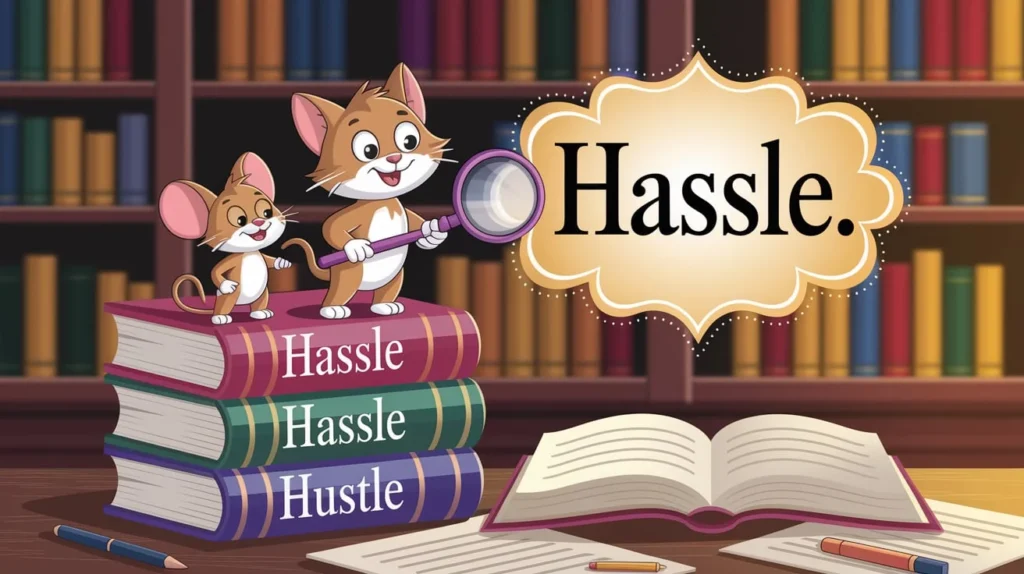If you’ve ever caught yourself wondering whether to spell it “hassle” or “hastle”, you’re not alone. This confusion is surprisingly common, and while it may seem like a small error, using the wrong spelling can affect your writing’s clarity and credibility. In this article, we’ll delve deep into the right way to use these words, why “hassle” is the correct choice, and how you can avoid common spelling mistakes.
Let’s explore this topic to ensure your writing is clear, professional, and precise.
What is “Hassle”?
The word “hassle” has been a part of the English language for a long time, and its meaning is well-known across various contexts. The term generally refers to something that is bothersome, troublesome, or annoying.
Hassle is often used in everyday conversations to describe tasks, people, or situations that require extra effort or cause unnecessary stress. It’s a versatile word that can be used in both casual and formal situations, but its definition remains consistent: a source of inconvenience.
Definition and Meaning of “Hassle”
In simple terms, hassle refers to any action, situation, or person that causes an unnecessary burden. It’s typically used to describe things that take more time, effort, or emotional energy than expected. For example, dealing with long queues, traffic jams, or completing tedious paperwork might be described as a hassle.
Example:
- “The meeting was a real hassle, and it took longer than expected.”
Origin of the Word
The origin of “hassle” is somewhat unclear, but it is believed to come from the Dutch word “haspelen”, which means to fumble or struggle. Over time, the term evolved and became a part of everyday English, especially in the 20th century.
Examples in Sentences
- “I really don’t want to deal with this hassle right now.”
- “It’s such a hassle to set up a new computer.”
What is “Hastle”?
Now that we’ve covered “hassle”, let’s talk about “hastle”. If you’ve seen or used this word before, don’t be too hard on yourself—it’s a common misspelling of “hassle,” and many people get it wrong due to the similar sounds of the words.
Is “Hastle” a Real Word?
Technically, “hastle” does not exist in standard dictionaries. It’s simply a misspelling or an incorrect variation of “hassle” that people tend to use. This error happens frequently, often because of the phonetic similarity between the two words.
It’s easy to see why “hastle” might seem right—“hassle” sounds like it should have a “t” in it. However, this extra letter is not part of the correct spelling.
Why Does “Hastle” Appear in Writing?
One reason “hastle” appears in writing is due to typing mistakes or a lack of attention to spelling. Another reason is that people might mishear the word, thinking that it’s spelled with an extra “t.” While this might seem minor, these small mistakes can have a significant impact on how others perceive your writing.
Examples of Incorrect Usage
- “Sorry for the hastle, but I need to reschedule.”
- “Dealing with this is such a hastle.”
As you can see, these examples are incorrect. The right spelling should be “hassle” in both instances.
Why “Hassle” is the Correct Word
Now, let’s dive deeper into why “hassle” is the only correct form of the word. Getting the spelling right not only improves the accuracy of your writing but also helps you maintain a high level of professionalism.
Historical Context and Evolution of “Hassle”
As mentioned earlier, “hassle” has roots in the Dutch language, but it has been an established part of English for centuries. Its use in the American English lexicon became widespread during the mid-20th century. Over time, it has become an essential part of the language, commonly used to describe frustrating situations.
Grammatical and Linguistic Perspective
From a linguistic standpoint, “hassle” is a noun that refers to something that is difficult or frustrating. It can also be used as a verb to describe the act of causing inconvenience. It is a versatile word in both spoken and written English, appearing in a wide range of contexts from everyday conversations to professional discussions.
Grammatical Use
- Noun: “That was a real hassle.”
- Verb: “I don’t want to hassle you, but can you help me?”
Importance of Correct Spelling
Using “hassle” correctly enhances the clarity and credibility of your writing. In both formal and informal settings, it’s crucial to use the correct spelling to maintain professionalism and avoid confusion. When you spell words properly, your communication becomes more effective.
Common Mistakes and Pitfalls
Even with all the resources available to us today, spelling mistakes are still common. One of the most frequently overlooked errors is the use of “hastle” instead of “hassle”. Let’s take a look at why this happens.
Spelling Mistakes and Misunderstandings
The misspelling of “hassle” as “hastle” is often due to the similarity in sound. Since both words sound alike, people may automatically add an extra “t” when writing. This mistake is especially common in casual conversations, text messages, or emails.
Impact of Spelling Errors
While using “hastle” instead of “hassle” might seem like a minor issue, it can have a bigger impact than you might think. Spelling mistakes, especially in professional writing, can hurt your credibility and authority as a writer. Inaccurate spelling can also cause readers to question the overall quality of your content.
For example, imagine reading a business proposal or email that contains frequent misspellings. It might leave you questioning whether the sender is detail-oriented and reliable. In some cases, spelling errors can even cause misunderstandings.
How to Avoid the “Hassle” of Spelling Errors
To ensure that your writing is clear and professional, it’s essential to avoid spelling mistakes like “hastle.” Here are some practical tips to help you:
Tips for Correct Usage
- Visual Mnemonics: One way to remember the correct spelling of “hassle” is to associate the word with the idea of something being a “double problem”. The two S’s in the word can symbolize a double annoyance, making it easier to remember.
- Break It Down: You can break the word down phonetically: H-A-S-S-L-E. Say it out loud: “Has-sle” – you won’t hear the extra “t” in there.
- Context: Whenever you’re writing, consider the context in which you’re using the word. Does it fit in with the overall message? Does “hassle” sound more natural than a variant like “hastle”? Trust your instincts!
Resources for Checking Spelling
- Spellcheckers: Tools like Grammarly and Hemingway can help spot errors in spelling, punctuation, and grammar.
- Online Dictionaries: Websites like Merriam-Webster and Oxford English Dictionary are trusted sources to verify correct spelling and usage.
- Proofreading: Always proofread your work. Taking a moment to read over your writing can help you catch mistakes that might otherwise slip through.
Real-Life Examples: “Hassle” in Action
Using the word “hassle” correctly is crucial for effective communication. Let’s look at a few real-life scenarios where the word is typically used:
Everyday Situations
- “Running errands in the city is always a hassle with traffic and parking.”
- “Finding the right parking spot was a real hassle.”
Professional Contexts
- “The project was delayed due to a few hassles with the supplier.”
- “It’s been a hassle trying to get approval for the new budget.”
In these examples, the word “hassle” fits naturally into both personal and professional conversations. It expresses a sense of inconvenience or frustration, which is the perfect use of the term.
FAQs: Hassle or Hastle?
1. Is “hastle” a real word?
No, “hastle” is not a real word in the English language. It is a misspelling of “hassle.” The correct word to use is always “hassle.”
2. What does “hassle” mean?
“Hassle” refers to a situation that is inconvenient, troublesome, or frustrating. It can be used as both a noun (e.g., “This paperwork is a hassle.”) and a verb (e.g., “Don’t hassle me about it.”).
3. Why do people spell it as “hastle”?
The misspelling occurs because of phonetic confusion—some people mistakenly think “hassle” should contain a “t.” This mistake is common in informal writing and among non-native English speakers.
4. How can I remember the correct spelling of “hassle”?
A useful trick is to remember that “hassle” has double ‘s’ like “stress”—which is fitting because hassles are stressful!
5. Can “hassle” be used in formal writing?
Yes, but it depends on the context. In professional or academic settings, alternatives like “difficulty,” “challenge,” or “inconvenience” may be more appropriate.
Conclusion
To sum up, “hassle” is the correct spelling, and “hastle” is simply a misspelling. Whether you’re writing an email, a blog post, or a formal letter, using correct spelling is crucial to maintain the professionalism and credibility of your communication. By following the tips outlined in this article, you can easily avoid these common pitfalls.
Take your time when writing and proofreading. With careful attention to detail, your writing will be clear, concise, and trustworthy—qualities that are essential in today’s fast-paced world.

Jordan Phoenix is a passionate writer and spiritual seeker dedicated to exploring the mystical world of angel numbers. With a deep understanding of numerology and a commitment to helping others on their spiritual journeys, Jordan crafts insightful articles that decode the meanings behind these celestial messages.



